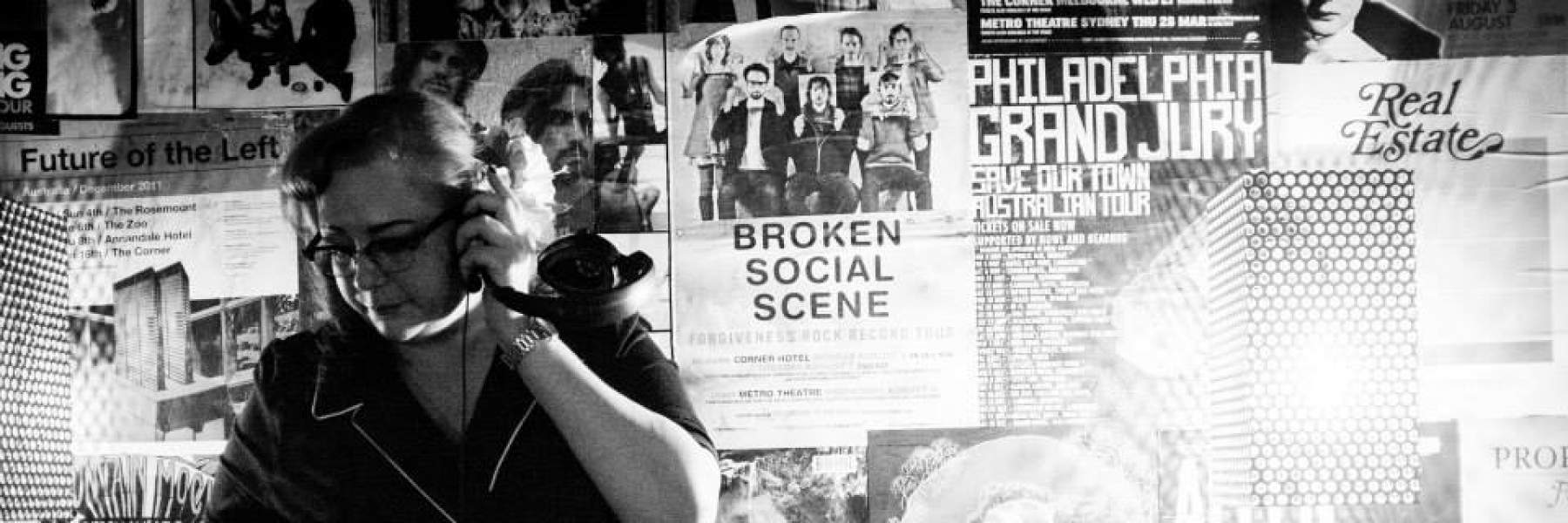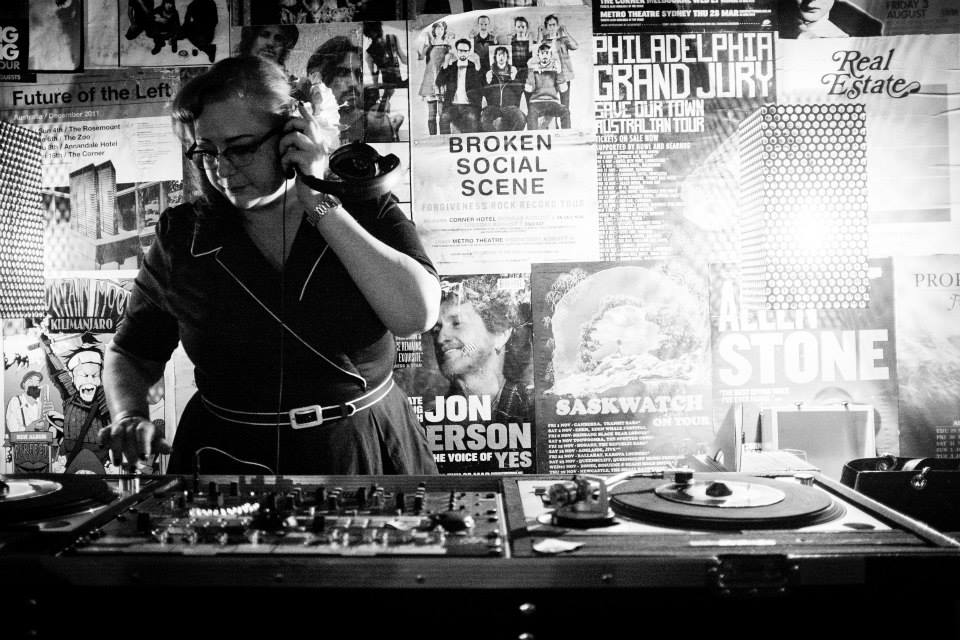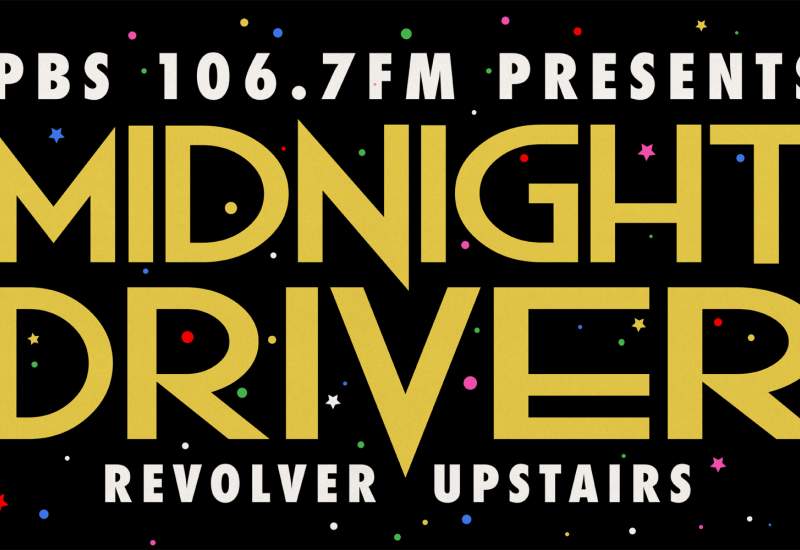In the lead up to Miss Goldie's Boss Action move to the Saturday timeslot of 3 to 5pm, we thought we'd revisit this announcer spotlight which was first published in our member magazine, Easey Mag, in May 2018. Boss Action moves into the previously held Soulgroove'66 timeslot.
"It's a huge honor to be moving into Pierre's timeslot. It was an iconic PBS show and he was a good mate, I really hope his listeners like my style of soul. I've jumped around the grid in my 13 years but I've found my forever home and am really looking forward to going back to a 2 hour show." Miss Goldie
Moving from Adelaide to Sydney in the late 80s and buying Aretha Franklin’s ‘Chain of Fools’ 45 was the jump off point for me from punk into soul. After playing the B-side ballad ‘Prove It’ I went from wanting to be angry to wanting to be sad.
After a stint of study in Adelaide, Japan and the US, I moved back to Sydney in the mid-90s. I realised I had good records that I could play out, so I started playing at a little funk club in Sydney run by Thomas Crown (Good Groove Records) every Wednesday night. I was very nervous to start off with and didn’t know any other female DJs in Sydney. At that point, I was just collecting funk and deep soul. From there I met a group of women called the Sydney soul sisters who introduced me to the northern soul scene and I joined their radio show Fire on the Wire on East Side Radio.
After a decade of living in Sydney, the music scene became frustrating – you couldn’t play without the clanging of poker machines in the background! That was when I decided to move to Melbourne to concentrate on music
My involvement with PBS happened almost instantaneously after I arrived in Melbourne. I arrived on Christmas Day in 2006 and on New Year’s Eve a friend of mine, Dave Sinclair (who had a radio show on PBS in the 80s), invited me to a party where I met DJ Manchild. Once Manchild and I started chatting, he offered me a guest spot on his show The Breakdown the very next Friday.
I went to PBS with my hand full of records and did the show with him. After seeing my collection, and some of the rare records I had, Manchild offered me a fortnightly guest spot on his show. Not long after, Manchild went overseas for three months and I covered his show for that time.
When first offered a spot on PBS, the program manager at the time said, “You can have a show, but you can’t do a soul show!” There were already a number of soul programs on the grid but I played completely different soul. In the end I said I’d do a funk show… but I didn’t just do a funk show… I did my show, which has always been a bit of funk and a bit of soul.
That was the beginning of Boss Action. In the start, it was very much late 60s and early 70s but those borders have stretched either side. I’ve branched out to play more R&B and I discovered popcorn and late-50s music since I first started the show.
I have a huge debt to PBS. I’ve had the chance to interview and DJ before some of my stone-cold idols. Being able to interview Marva Whitney was one of the highlights of life, not just radio! The same goes for Eddie Bo. Being able to sit and talk with them after collecting their records for 20 years was an incredible privilege and thrill!
There are a lot more female soul DJs now from when I started. There was only Emma Peel when I came to Melbourne. I’ve seen more women decide to DJ. I remember CC:DISCO! (presenter of Smoke and Mirrors) as a young woman working in the office at PBS grow to where she is now… PBS nurtures everybody and they are very encouraging to women.
At the end of the day, I’m a collector. It’s as much about the artefact and the history for me as it is the music. I continued buying records throughout the 80s (when others switched to CDs), collecting old punk records. The punk releases were small, independent bands self-releasing – mostly 45s, so I was already familiar with this format when my focus shifted to soul.
I trawl through YouTube, sales lists and eBay looking for particular labels or writers, singers or producers, but most of the time, I’ll look at a label and think that looks nice, what’s that? And you just have to keep putting in the hours to search for stuff and trust your ear.
My career highlight to date has to be touring with Sharon Jones & the Dap-Kings. They’d come out the year I’d moved to Melbourne and as I wasn’t doing the support for them (though I had previously when I lived in Sydney) Gabe (Gabriel Roth – bass player, band leader, primary songwriter and producer) asked why I wasn’t supporting in Melbourne. The next time they came out, he put me on the tour with them. That was amazing. Some shows I played to up to 4000 people! When Gabe briefed me he said, “Play whatever you want, Goldie! Just play us good tunes!”
Whenever Sharon Jones & the Dap-Kings came to Australia, I’d always give them a mix which they would listen to as they drove around the country. Last time they were here, I asked Gabe to come in for an interview and I wanted to talk about Daptone Records (rather than interview Sharon as I knew of her health condition) and at the end of the interview he said, “I want everyone to know that you’ve influenced my writing.” Gabe started writing these crossover, really sweet records which were a result of the mix compilations I complied for the band over the years. It was one of my proudest moments.
Before the interview, Gabe had asked the horn section to learn my favourite ballad ‘Make it Good to Me’ which they performed for the first time on the night. Sharon didn’t want to perform it as she preferred the gutsy ones but as I watched the exchange, Gabe said, “It’s for Samantha” and she said who? And he said, “Goldie” and she said, “OOOH Goldie!” and turned around to sing the song. I cried.
Lisa Gibbs was a PBS music library volunteer, and an occasional PBS announcer


